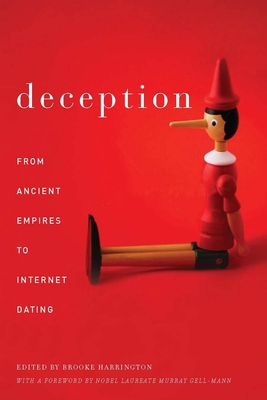

 Stanford University Press
Stanford University Press
Deception: From Ancient Empires to Internet Dating


Key Metrics
- Brooke Harrington
- Stanford University Press
- Hardcover
- 9780804756495
- 9.1 X 6.1 X 1.1 inches
- 1.3 pounds
- Psychology > Interpersonal Relations
- English
 Secure Transaction
Secure TransactionBook Description
From Internet-dating profiles to Native American folktales to the photo trickery of Hollywood gossip magazines, this volume explores deception and offers insights from leading figures in disparate fields, drawing out surprising commonalities. For the first time, one broadly accessible volume pulls together classic philosophical debates on deception with examinations of contemporary issues, including stock market fraud and terrorism. Deception offers a unique perspective on the state of the art: readers will find scholars from biology and physics in conversation with experts in mass media and culture, and archaeologists engaged with ideas from military strategists.
As the essays make clear, deception touches virtually every aspect of our lives; in fact, recent psychological research suggests that we each tell at least two to three lies per day. Throughout the animal kingdom, survival and reproduction depend upon successful deceptions.
But while deception has captured the interest of philosophers, scientists, warriors, and artists over thousands of years, our knowledge of the subject is limited. At the same time, new technologies have made deception more commonplace, more dangerous, and more difficult to detect than ever. Deception is a particularly timely and insightful work. Its scope and subject make it compelling reading for a broad readership.
Author Bio
Brooke Harrington is a sociology professor at Dartmouth College. She is the author of Pop Finance and Capital Without Borders: Wealth Management and the One Percent.
Who creates change in markets and other financial institutions? My research for the past 15 years has investigated this question in a variety of empirical domains. I am an economic and organizational sociologist by training, with an empirical focus on finance, taxation and the professionals who specialize in those domains. My latest book for Harvard University Press concerns an elite occupational group within finance and its impact on international law and stratification. Previously, my research examined the effects of diversity and decision-making processes on the performance of investment groups.
I'm interested in how things get done--what social actors actually do in their daily lives--and how that aggregates to the macro-level of financial markets, culture and political institutions. My work intersects with the literatures of political economy, anthropology, social psychology and behavioral finance.
Research Interests
Economic sociology: financial markets and offshore banking /Sociology of stratification: wealth and taxation in connection to inequality /Sociology of the professions: elite and transnational professionals /Political sociology: states and the legal-financial ecosystem of tax havens /Organizational sociology: family firms, groups and diversity
Education
B.A. Stanford University
M.A. Harvard University
Ph. D. Harvard University
Source: Dartmouth College and brookeharrington.com
Videos
No Videos
Community reviews
Write a ReviewNo Community reviews